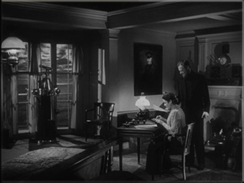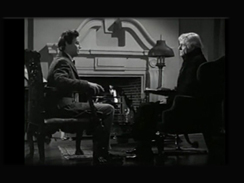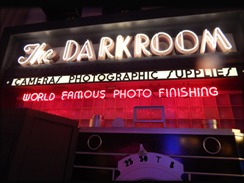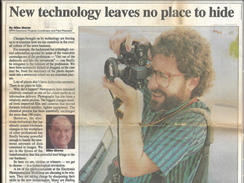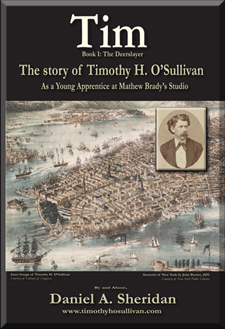An NYU Dropout Drops Back In
By Daniel A. Sheridan
This article appeared in Arch Type, the New York University Journalism School Magazine — Spring, 1988.
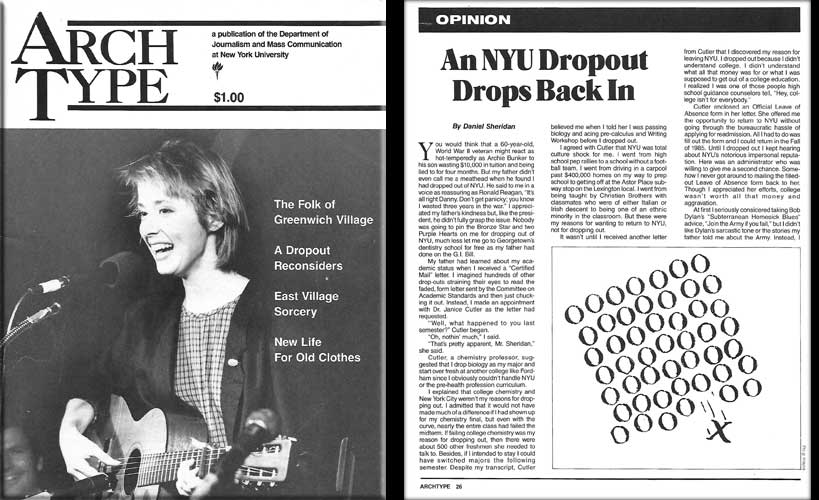
You would think that a 60-year-old World War II veteran might react as hot-temperedly as Archie Bunker to his son wasting $10,000 in tuition and being lied to for four months. But my father didn't even call me a meathead when he found I had dropped out of NYU. He said to me in a voice as reassuring as Ronald Reagan, "It's all right Danny. Don't get panicky; you know I wasted three years in the war." I appreciated my father's kindness but, like the president, he didn't fully grasp the issue. Nobody was going to pin the Bronze Star and two Purple Hearts on me for dropping out of NYU, much less let me go to Georgetown's dentistry school for free as my father had done on the GI Bill.
My father had learned about my academic status when I received a "Certified Mail" letter. I imagined hundreds of other drop-outs straining their eyes to read the faded, form letter sent by the Committee on Academic Standards and then just chucking it out. Instead, I made an appointment with Dr. Janice Cutler as the letter had requested.
"Well, what happened to you last semester?" Cutler began.
"Oh, nothin' much," I said.
"That's pretty apparent, Mr. Sheridan," she said.
Cutler, a chemistry professor, suggested that I drop biology as my major and start over fresh at another college like Fordham since I obviously couldn't handle NYU or the pre-health profession curriculum.
I explained that college chemistry and New York City weren't my reasons for dropping out. I admitted that it would have not have made much of a difference if I had shown up for my chemistry final, but even with the curve, nearly the entire class had failed the midterm. If failing college chemistry was my reason for dropping out, then there were about 500 other freshmen she needed to talk to. Besides, if I intended to stay I could have switched majors the following semester. Despite my transcript, Cutler believed me when I told her I was passing biology and acing pre-calculus and Writing Workshop before I dropped out.
I agreed with Cutler that NYU was total culture shock for me. I went from high school pep rallies to a school without a football team. I went from driving in a carpool past $400,000 homes on my way to prep school to getting off at the Astor Place subway stop on the Lexington local. I went from being taught by Christian Brothers with classmates who were of either Italian or Irish descent to being one of an ethnic minority in the classroom. But these were my reasons for wanting to return to NYU, not for dropping out.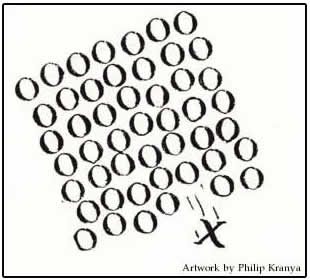
It wasn't until I received another letter from Cutler that I discovered my reason for leaving NYU. I dropped out because I didn't understand college. I didn't understand what all that money was for or what I was supposed to get out of a college education. I realized I was one of those people high school guidance counselors tell, "Hey, college isn't for everybody."
Cutler enclosed an Official Leave of Absence form in her letter. She offered me the opportunity to return to NYU without going through the bureaucratic hassle of applying for readmission. All I had to do was fill out the form and I could return in the Fall of 1985. Until I dropped out, I kept hearing about NYU's notorious impersonal reputation. Here was an administrator who was willing to give me a second chance. Somehow I never got around to mailing the filled out Leave of Absence form back to her. Though I appreciated her efforts, college wasn't worth all that money and aggravation.
At first I seriously considered Bob Dylan's "Subterranean Homesick Blues" advice "Join the Army if you fail," but I didn't like Dylan's sarcastic tone or the stories my father told me about the Army. Instead, I looked through the classified section of my local newspaper. Besides being a broiler cook for the past three years, knowing how to print black and white film since the age of eight was my only job skill. I answered an ad for a darkroom technician/route driver and found that driving a car also counted as a job skill.
I ended up driving over 100 miles a day in my '67 Chevelle, delivering black and white processing to camera shops in Westchester County. In the morning I printed the contact sheets, packed up the work, and went out on the route. For six hours of the day I was out on my own in my car without any boss or college textbooks. My only worries on the job were keeping my old car running, getting back before 4:00 p.m., and not ending up in an accident.
Except for several part-time jobs, this was the first time somebody was paying me money to waste 40 hours of my time. I wasn't handing over $10,000 a year to get a diploma which only might get me a job. There was no money back guarantee on a college diploma. I got a good job without the diploma. I didn't intend to keep that job forever. I figured with a couple more years experience I could learn to drive a truck and maybe get a job with the United Parcel Service.
In high school, I was never the type to ask the teacher about a subject, "Yeah, but what good is this?" I liked the idea of education being a complete waste of time and money. I didn't mind not seeing how Euclidean Geometry or reading about Pip's Great Expectations would land me a great job. Even though nobody dreamed up the idea of putting a price on learning in 400 BC, wasting time listening to Plato or Socrates meant you were not out on the vineyard crushing grapes with your feet.
The essential difference for me between all my previous schooling and college was the blank space after the word 'major.' To be honest, none of my childhood dreams were on that list of college majors. I wanted to be as good a catcher as Thurman Munson and chew tobacco like Sparky Lyle, but I couldn't find baseball in NYU's course list. Desire for an education alone was not a good enough reason to go to college, I thought. You had to decide on a major you never dreamed about as a child.
So like many of my friends in high school, who seemed to make overnight discoveries of their lifelong desires to become accountants, I settled on majoring in biology so that I could go to dentistry school like my father had. But I also thought I would be given more time than the summer of my high school senior year to contemplate a lifelong dedication to the field of medicine.
On registration day, my student advisor pushed aside the list of courses I intended to take. "No, no, pre-meds have to take biology and chemistry in the same semester, they're co-requisites," he informed me, and then feverishly made up a new schedule. My first big day of college was spent on a five hour drop/add line correcting my schedule conflict. I made the mistake of assuming my student advisor would not overlap my classes, but he scheduled two different classes for the same time. I ended up in six hours a week of chemistry lab, three hours in biology lab, four hours in lecture, one hour in recitation, and one hour in chemisty lab lecture.
As I told Cutler, I could have switched my course load the following semester, but I thought I understood what college was all about.Choosing biology as my major only made me aware of it sooner. College seemed like an expensive, inefficient, and overblown way to learn a trade. It was a pair of jeans whose price varied according to the brand name stitched to the back pocket. Whether it was $40,000 for an NYU label or $60,000 for a Columbia label, it all seemed like textbooks and denim to me. If the purpose of education involved purchasing the name of a college in order to impress future employers, I would rather save time, effort, and money, and just get a regular job.
As I drove around Westchester County in the Spring of 1985, I regretted more than anything that release that comes with the last day of school before summer vacation. In every town from Yonkers to Larchmont I saw kids rejoicing at not having to go to school. I had no books to burn or report cards to regret receiving.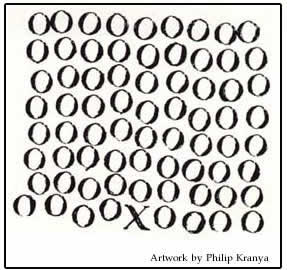
During the summer I read an article in the Sunday Daily News about famous college drop-outs which I thought would confirm my belief about college being a waste of money. Even though dropouts like Peter Jennings of ABC News made their millions without their diploma, they still regretted not finishing college. I also thought about the commercial for the United Negro College Fund which stated, " A mind is a terrible thing to waste."
In midsummer I filled out my Leave of Absence form and mailed Cutler a letter which began, "Before you circular file this under College Drop Out..." and basically asked her for a third chance. After waiting four months for a reply, I was sure NYU had forgotten about me. In November, Thea L. Browne, Assistant Dean of Academic Standards, granted my request to return to NYU in the Spring of 1986. I jumped at the opportunity and ignored my boss's sarcastic comment, "Why would NYU say 'No' to another ten grand?"
This article appeared in Arch Type, the New York University Journalism School Magazine — Spring, 1988.
